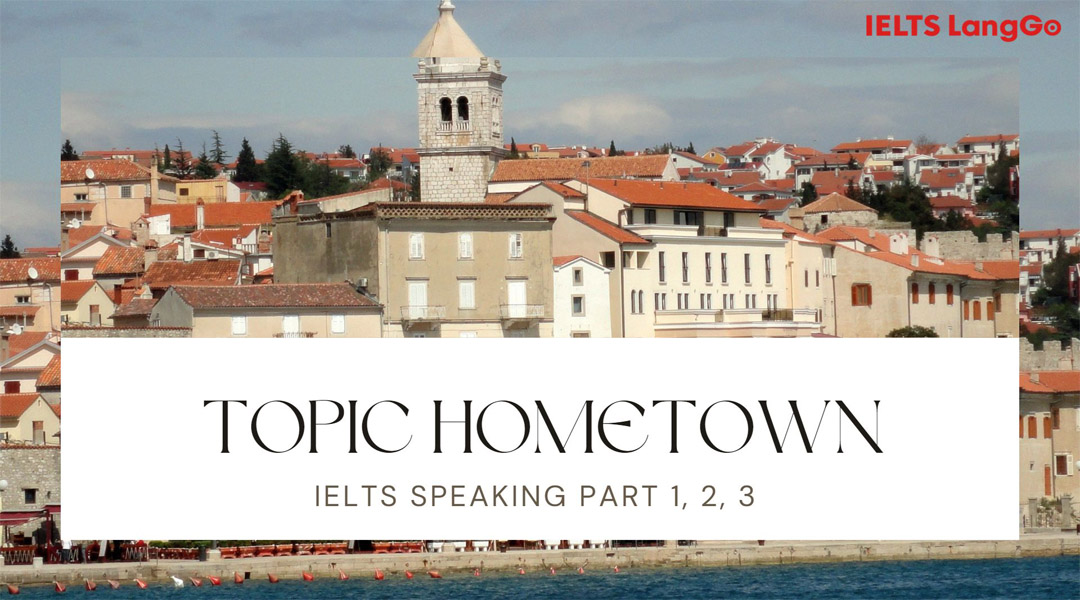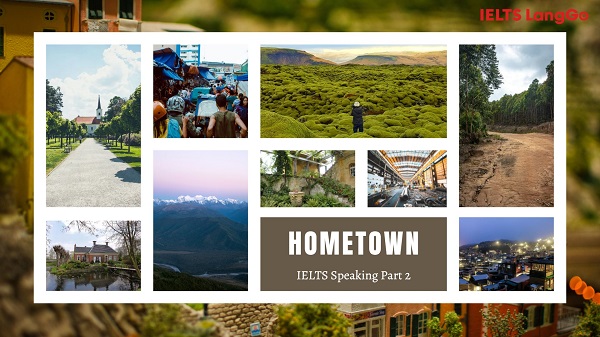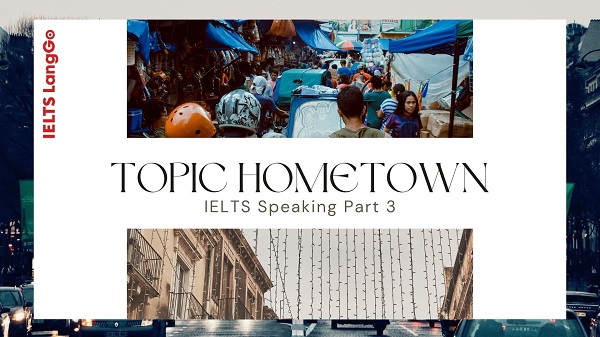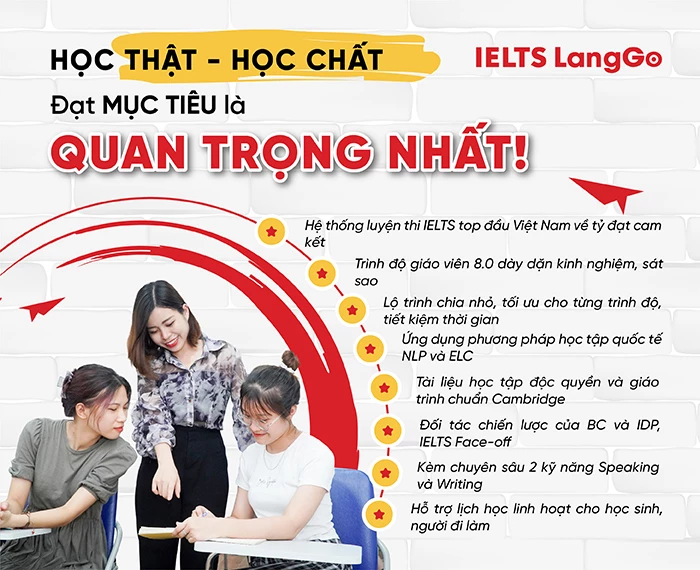


Chủ đề HOMETOWN khá nổi bật và thường xuyên xuất hiện xuất hiện trong các đề thi IELTS Speaking.
Bài viết dưới đây, LangGo sẽ chia sẻ tới bạn đọc những mẫu câu hỏi và mẫu câu trả lời cho bài Describe your Hometown ở cả 3 phần thi Speaking. Cùng tham khảo nhé!
1. Describe your hometown.
Answer: My hometown is a small city. It is both traditional and modern because of having several festivals celebrated by the locals, and at the same time The increasing number of infrastructures and establishments makes it start to be developed.
2. Where is your hometown located in?
Answer: I come from a vibrant city called [Your Hometown], which is situated in [Country/Region]. It's a bustling metropolis with a perfect blend of modernity and tradition. The city is known for its diverse culture, historical landmarks, and lively atmosphere.
3. What do you like most about your hometown?
Answer: One of the things I love most about my hometown is its cultural diversity. We have people from various backgrounds, and this diversity is reflected in our festivals, cuisine, and daily life. It creates a rich tapestry of experiences and allows for a wide range of cultural celebrations.
4. Are there any famous landmarks in your hometown?
Answer: Absolutely, [Your Hometown] boasts some iconic landmarks. One that comes to mind is [Name of Landmark], a historical site that dates back to [historical period]. It not only serves as a reminder of our heritage but is also a popular spot for both locals and tourists.
5. How has your hometown changed over the years?
Answer: Over the years, I've witnessed significant changes in [Your Hometown]. The city has undergone urban development, with the introduction of modern infrastructure, shopping malls, and improved transportation. While these changes bring convenience, there's also a nostalgic charm to the way things used to be.
Describe your home town (Hãy tả về quê hương của bạn)
You should say:

Describe about your hometown - Speaking part 2
Câu trả lời mẫu:
My hometown is called Sorsogon. I was born and raised there and I can say it is definitely my favorite place. It is located in the southernmost tip of the largest island in my country. I cannot tell that it is a very big province. The town is both traditional and modern. I call it traditional because there still are many festivals celebrated by the locals, yet modern, as it is starting to be developed just like other province having much more sophisticated infrastructure.
Sorsogon is a province that is about 12-hour bus ride from the capital city of the Philippines. Main roads are part of the national highway, so they are wide and huge. The highway happens to be an important place, because it is a key passage for buses and cars that cross it on their way from the North to the South.
Sorsogon is also special as it offers many tourist attractions. For example, in a close vicinity, there are an active volcano and a lake with very beautiful scenery.
Among all the places I have been to, I think Sorsogon is one of the best. There are wonderful places to visit – not crowded and not polluted. I frequently go to beautiful and clean beaches. Sogroson is located on many islands that are not yet developed and are very peaceful and relaxing to stay in. On top of that, natural cold and hot springs are popular here as well. Many people visit this place to experience them.
Tham khảo thêm:
1. In what ways can you improve your hometown?
One problem in my hometown is a low accessibility of some places due to problems of public transportation systems. Although there are different means of transportation, it can still take you hours to get to certain venues. For example, the earliest bus leaves at 5:00 am and the latest – around 5:30 pm. Therefore, for those who go back from work after 5:30 pm, it gets increasingly difficult to commute.

IELTS Speaking about Hometown: Part 3
2. What is the main reason for liking a hometown other than the fact you were born there?
I reckon, we all love our hometowns, because we were raised there. I am personally used to this place and I have become very comfortable with it. I have created some very pleasant memories here – met friends, family, my first love, first academic achievements. In my hometown I was formed physiologically as an individual.
3. Most people in this world do not live in their hometowns. Why?
Well, I guess the majority of people feel that there could be more opportunities outside of their hometowns and consequently – comfort zones. Therefore, many believe that living in such a comfortable place, with relatives and friends can be distracting and too relaxing on the way of pursuing goals. Also, people (not only youth) strive to explore other places and experience different cultures across the globe.
Trên đây là một số câu hỏi và câu trả lời mẫu cho chủ đề Describe your Hometown Speaking IELTS Part 1, 2, 3. Hometown là một chủ đề rất hay được hỏi trong phần thi Speaking, hy vọng rằng những Speaking Samples mà LangGo sưu tầm và chia sẻ trên đây sẽ giúp các bạn chinh phục chủ đề này một cách dễ dàng và đạt band điểm cao trong IELTS Speaking.
Nguồn tham khảo: thetesttaker



ĐẶT LỊCH TƯ VẤN MIỄN PHÍ LỘ TRÌNH Săn ƯU ĐÃI lên tới 12.000.000đ